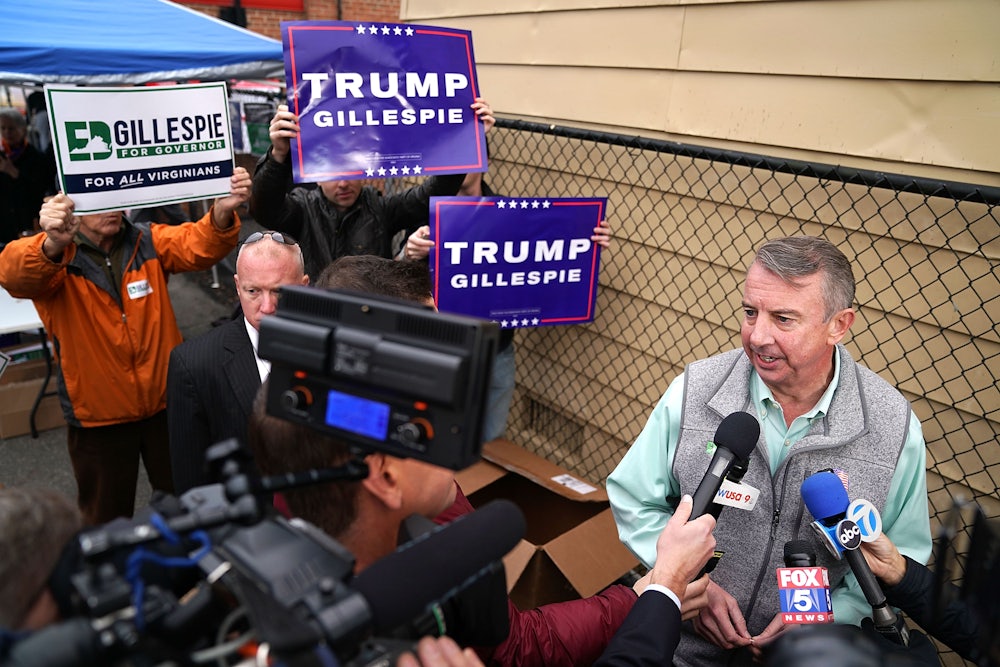In the days leading up to Tuesday’s elections, two narratives were solidifying. One was that the Democrats, as usual, were in disarray. Ralph Northam, Virginia’s moderate lieutenant governor, looked like he was blowing the gubernatorial race against Republican Ed Gillespie. Never the most dynamic campaigner, Northam faced a liberal revolt when he reversed his position on sanctuary cities in the eleventh hour. His poll-averaged lead had shrunk to two-and-a-half points, down from six a month earlier. Meanwhile, his party was in shambles: A new book from former Democratic National Committee Chair Donna Brazile claimed that Hillary Clinton had “rigged” the Democratic primary in 2016, and a poll showed that Democrats’ favorability ratings had hit a 25-year low.
There were also signs that Republicans had figured out a way to capitalize on Donald Trump’s unlikely success in 2016. Gillespie, a former Republican National Committee chair and lobbyist synonymous with the Republican establishment, seemed to have found a playbook that could work for Republican candidates. Gillespie kept his personal distance from Trump, but embraced his underbelly-of-American-politics style. The tax cut that Gillespie ran on in the Republican primaries was out; defending Confederate monuments and attacking the gang MS-13 were in. This combination, which allowed Gillespie to appeal both to suburban voters and to Trump diehards, was considered potentially lethal. Trump may be historically unpopular, but Gillespie had apparently found a way to square the circle.
Welp. Looking at the results from Tuesday’s elections, Republicans should be very, very worried about the future. Northam routed Gillespie. There were other elections, too: In New Jersey, Democrat Phil Murphy won handily, as expected, and Bill de Blasio was re-elected as mayor of New York City. That may not sound surprising, but Democrats haven’t won all three of those races since 1989.
And if you look at the state delegate races in Virginia, it’s clear that Republicans are facing a tidal wave of discontent. Virginia’s House of Delegates was heavily gerrymandered in the GOP’s favor in 2011—Republicans had a 66-34 majority at the start of the night. Virginia Democrats contested every House of Delegates seat and, as of this writing, have a good shot of winning the chamber. Furthermore, Virginia elected its first transgender and first Democratic Socialist assembly members.
Democrats started Tuesday in a fight about what kind of Democrat can win. The answer to that question, judging by Tuesday’s results, is any Democrat.
There was a palpable enthusiasm gap in Virginia, and across the country, on Tuesday. Gillespie won many of the same areas as Trump by similar percentages, but he garnered significantly fewer votes. Northam, meanwhile, crushed it in areas where Democrats are concentrated, outperforming Hillary Clinton with young people and even women. The bottom line: Democrats are more motivated than they were in 2016; Republicans are less motivated.
That’s a fairly normal situation for an incumbent party, but there does seem to be a Trump effect driving turnout for Democrats. Trump, in a hilarious bit of spin (and a terrifying first stab at a 280-character tweet), tried to argue that Gillespie lost because he didn’t embrace Trump enough.
Ed Gillespie worked hard but did not embrace me or what I stand for. Don’t forget, Republicans won 4 out of 4 House seats, and with the economy doing record numbers, we will continue to win, even bigger than before!
— Donald J. Trump (@realDonaldTrump) November 8, 2017
But this clearly wasn’t the case. Gillespie used Trump’s playbook and failed. Unfortunately for Trump, the four House special elections he cites were all in very safe Republican districts, and the biggest lesson of Tuesday’s election is that there may be far fewer very safe Republican districts than we thought.
But the race in Virginia wasn’t just a rebuke of Donald Trump. It was a rebuke of the entire Republican Party. Voters clearly rejected Gillespie’s adoption of Trump/Bannon politics, particularly his attempt to turn immigration and Confederate monuments into a wedge. It certainly didn’t drive turnout in the rural areas that Trump won, and may have depressed turnout in the suburbs of Northern Virginia.
But exit polling suggests that health care, an issue that barely came up in the gubernatorial race, was the number one issue for four of ten voters. That’s a big problem for Republicans, who have repeatedly tried to repeal Obamacare in the past year. Republicans have since raced forward with a deeply unpopular corporate tax cut under the assumption that they, like Gillespie, can exploit identity politics in the 2018 midterm elections. The results in Virginia suggest this strategy isn’t very effective.
The 2018 midterm elections, of course, are a long ways away. But there is a lot for Democrats to feel good about in Tuesday’s results and very little for Republicans to feel good about. All Democrats needed in Virginia was a win, even a narrow one. They got way more than that.
